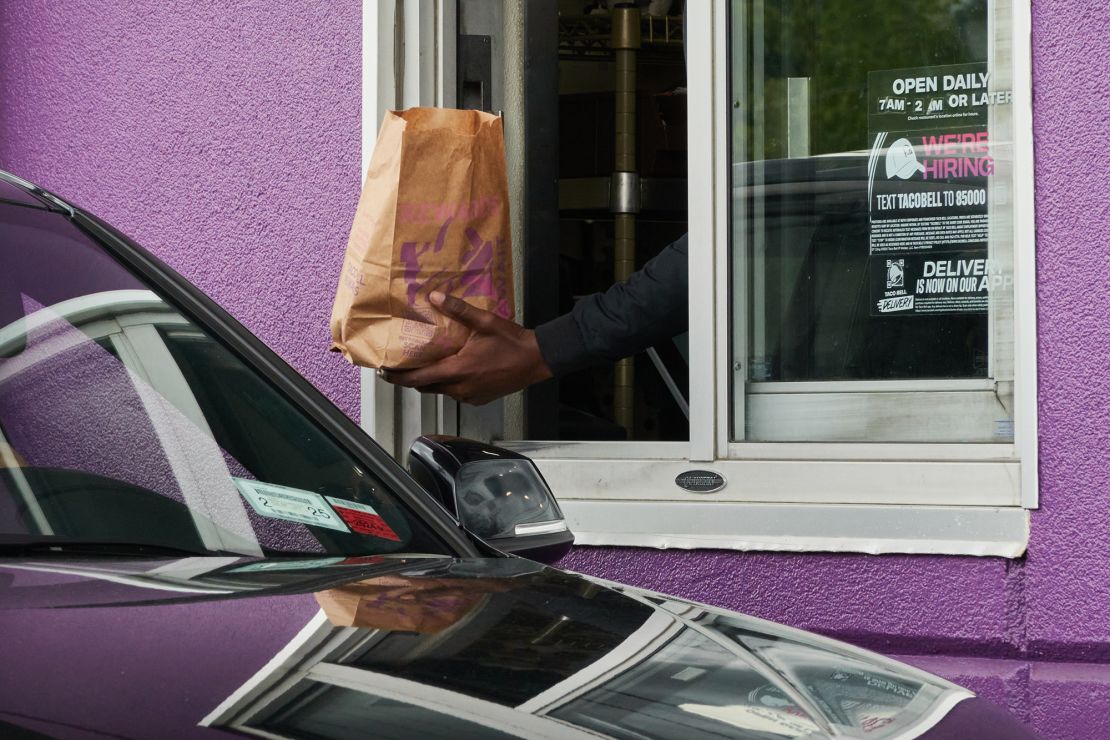New York
CNN
—
With interest rates high, student loan repayments back and elevated prices of consumer goods, many Americans are pulling back on spending. But not at Taco Bell.
The fast food chain, which has long emphasized its cheap eats, said that unlike some of its competitors, it’s been seeing growth across all income levels as customers flock to its value deals and trade down from pricier options.
In the US, Taco Bell is seeing 2-3% growth in the number of orders “across all income levels,” said David Gibbs, CEO of Taco Bell’s parent company Yum Brands, during an analyst call Wednesday discussing the company’s third quarter financial results. Yum Brands also owns KFC, Pizza Hut and the Habit Burger Grill.
“So our stores in lower-income trade areas are performing well … just like our stores in high-income trade areas,” he said. Sales at Taco Bell’s US stores open at least a year jumped 8% in the third quarter, year over year.

At Taco Bell, customers can buy a combo meal, including a fountain drink, burrito, taco and cinnamon twists for dessert, for about $5. The chain also still offers food for $1, making it something of an exception in the industry.
Taco Bell’s website shows a cheesy bean and rice burrito; spicy potato soft taco; and cheesy roll-up available for $1 each. Even its higher-priced, limited time offerings are relatively inexpensive: The much-publicized volcano taco was priced at about $2.49 — less than an order of McDonald’s fries, in some locations.
Fast food chains are constantly walking the line between offering margin-squeezing deals and losing customers if prices get too high. Taco Bell’s relatively inexpensive ingredients and small serving sizes — plus its own focus on value — help put it in a sweet spot.
And in the third quarter, customers didn’t only go for the cheapest items, helping keep the Taco Bell’s margins high.
Sales of value items remained within the chain’s target range, said Gibbs, adding that the market positioning helped Taco Bell maintain profit margins of 24%, a level he described as “industry-leading.” Globally, Yum’s same-restaurant sales jumped 6% in the quarter, and the company added new locations across its three largest brands of Taco Bell, Pizza Hut, and KFC. Shares of the company were more or less flat during trading hours Wednesday.
Taco Bell is also benefiting from people searching for less expensive food options, Gibbs said. Other fast food chains have also clocked customers trading down, with mixed results.
Consumers trade down
Some other fast food brands are also seeing more customers thanks to the trend. Wingstop, for example, is finding that when customers start looking to save on food, they start thinking about chicken wings.
When customers ditch pricier options, “Wingstop is uniquely positioned to gain more new guests,” CEO Michael Skipworth said Wednesday during an analyst call discussing quarterly results. Wingstop’s domestic same-restaurant sales, which include sales at restaurants open at least a year, jumped 15.3% in the third quarter.
At McDonald’s, results were more mixed.
“We continue to gain share with both the middle- and higher-income consumers,” said McDonald’s CFO Ian Borden during an analyst call this week discussing third-quarter result, noting that the trend is thanks in part to “the trade-down from more expensive alternatives.”
But the burger chain, which said it expects prices to be up a little over 10% for the year, is seeing lower-income customers falter.
“We’ve been talking about how the consumer is more discriminating because of all the price pressures that they’re facing,” CEO Chris Kempczinski said during the call, adding that “what you end up seeing is that the pressure is felt more on the lower-income consumer.” Kempczinski called this an industry-wide trend. At McDonald’s US locations open at least 13 months, sales still grew 8.1% in the quarter.
Denny’s described a similarly mixed dynamic.
“We do believe that casual [dining] probably is trading down into us, but we also believe that we’re probably trading down into [quick-service restaurants] a little bit,” said Denny’s CFO Robert Verostek during an analyst call this week, also discussing third-quarter results. Sales at Denny’s restaurants open at least a year ticked up 1.8% in the third quarter, compared to the same period last year.
